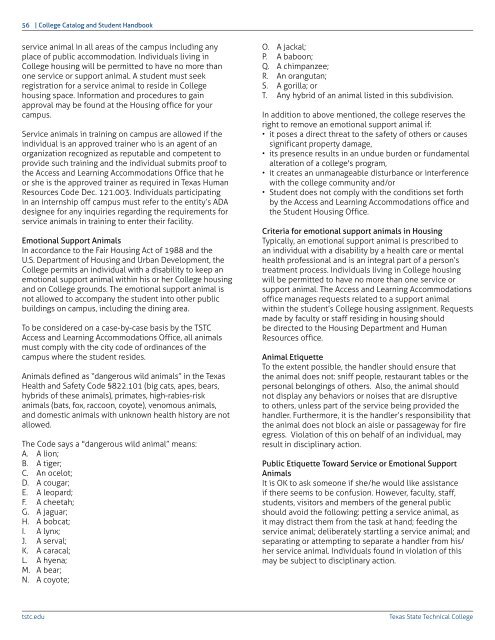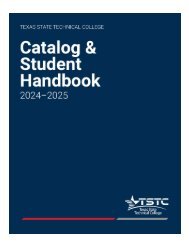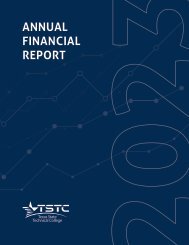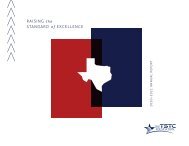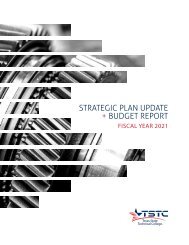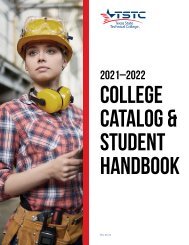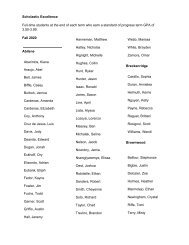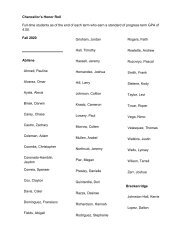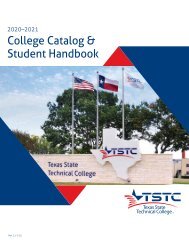Student Handbook and Catalog 2021-22 V2
You also want an ePaper? Increase the reach of your titles
YUMPU automatically turns print PDFs into web optimized ePapers that Google loves.
56 | College <strong>Catalog</strong> <strong>and</strong> <strong>Student</strong> <strong>H<strong>and</strong>book</strong><br />
service animal in all areas of the campus including any<br />
place of public accommodation. Individuals living in<br />
College housing will be permitted to have no more than<br />
one service or support animal. A student must seek<br />
registration for a service animal to reside in College<br />
housing space. Information <strong>and</strong> procedures to gain<br />
approval may be found at the Housing office for your<br />
campus.<br />
Service animals in training on campus are allowed if the<br />
individual is an approved trainer who is an agent of an<br />
organization recognized as reputable <strong>and</strong> competent to<br />
provide such training <strong>and</strong> the individual submits proof to<br />
the Access <strong>and</strong> Learning Accommodations Office that he<br />
or she is the approved trainer as required in Texas Human<br />
Resources Code Dec. 121.003. Individuals participating<br />
in an internship off campus must refer to the entity’s ADA<br />
designee for any inquiries regarding the requirements for<br />
service animals in training to enter their facility.<br />
Emotional Support Animals<br />
In accordance to the Fair Housing Act of 1988 <strong>and</strong> the<br />
U.S. Department of Housing <strong>and</strong> Urban Development, the<br />
College permits an individual with a disability to keep an<br />
emotional support animal within his or her College housing<br />
<strong>and</strong> on College grounds. The emotional support animal is<br />
not allowed to accompany the student into other public<br />
buildings on campus, including the dining area.<br />
To be considered on a case-by-case basis by the TSTC<br />
Access <strong>and</strong> Learning Accommodations Office, all animals<br />
must comply with the city code of ordinances of the<br />
campus where the student resides.<br />
Animals defined as “dangerous wild animals” in the Texas<br />
Health <strong>and</strong> Safety Code §8<strong>22</strong>.101 (big cats, apes, bears,<br />
hybrids of these animals), primates, high-rabies-risk<br />
animals (bats, fox, raccoon, coyote), venomous animals,<br />
<strong>and</strong> domestic animals with unknown health history are not<br />
allowed.<br />
The Code says a "dangerous wild animal” means:<br />
A. A lion;<br />
B. A tiger;<br />
C. An ocelot;<br />
D. A cougar;<br />
E. A leopard;<br />
F. A cheetah;<br />
G. A jaguar;<br />
H. A bobcat;<br />
I. A lynx;<br />
J. A serval;<br />
K. A caracal;<br />
L. A hyena;<br />
M. A bear;<br />
N. A coyote;<br />
O. A jackal;<br />
P. A baboon;<br />
Q. A chimpanzee;<br />
R. An orangutan;<br />
S. A gorilla; or<br />
T. Any hybrid of an animal listed in this subdivision.<br />
In addition to above mentioned, the college reserves the<br />
right to remove an emotional support animal if:<br />
• it poses a direct threat to the safety of others or causes<br />
significant property damage,<br />
• its presence results in an undue burden or fundamental<br />
alteration of a college's program,<br />
• it creates an unmanageable disturbance or interference<br />
with the college community <strong>and</strong>/or<br />
• <strong>Student</strong> does not comply with the conditions set forth<br />
by the Access <strong>and</strong> Learning Accommodations office <strong>and</strong><br />
the <strong>Student</strong> Housing Office.<br />
Criteria for emotional support animals in Housing<br />
Typically, an emotional support animal is prescribed to<br />
an individual with a disability by a health care or mental<br />
health professional <strong>and</strong> is an integral part of a person’s<br />
treatment process. Individuals living in College housing<br />
will be permitted to have no more than one service or<br />
support animal. The Access <strong>and</strong> Learning Accommodations<br />
office manages requests related to a support animal<br />
within the student’s College housing assignment. Requests<br />
made by faculty or staff residing in housing should<br />
be directed to the Housing Department <strong>and</strong> Human<br />
Resources office.<br />
Animal Etiquette<br />
To the extent possible, the h<strong>and</strong>ler should ensure that<br />
the animal does not: sniff people, restaurant tables or the<br />
personal belongings of others. Also, the animal should<br />
not display any behaviors or noises that are disruptive<br />
to others, unless part of the service being provided the<br />
h<strong>and</strong>ler. Furthermore, it is the h<strong>and</strong>ler’s responsibility that<br />
the animal does not block an aisle or passageway for fire<br />
egress. Violation of this on behalf of an individual, may<br />
result in disciplinary action.<br />
Public Etiquette Toward Service or Emotional Support<br />
Animals<br />
It is OK to ask someone if she/he would like assistance<br />
if there seems to be confusion. However, faculty, staff,<br />
students, visitors <strong>and</strong> members of the general public<br />
should avoid the following: petting a service animal, as<br />
it may distract them from the task at h<strong>and</strong>; feeding the<br />
service animal; deliberately startling a service animal; <strong>and</strong><br />
separating or attempting to separate a h<strong>and</strong>ler from his/<br />
her service animal. Individuals found in violation of this<br />
may be subject to disciplinary action.<br />
tstc.edu<br />
Texas State Technical College


